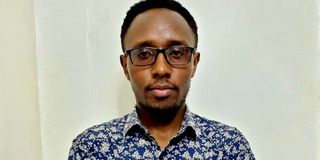The story of Michael Kishoyian's fight against FGM

Michael Kishoyian, a UNFPA youth advisory panel member. The 25-year-old is an anti-FGM advocate and campaigns through clubs in schools in Narok County.
What you need to know:
- Many people don’t acknowledge the link between FGM and health complications.
- It’s often seen as a reproductive health issue or a natural part of ageing.
- This denial persists even as people suffer.
At eight years old, Michael Kishoyian witnessed his 15-year-old cousin’s circumcision.
"My elder sister and I sneaked out of our house at around 5:30am to where the ceremony was being held. I wore one of my sister’s dresses to hide that I was a boy. My cousin was being held down by three women. I ran back home when she started crying and screaming."
At the time, Michael could not understand what was happening but assumed it was a celebration because there was a lot of festivity in his home. Despite the pain, female genital mutilation/circumcision (FGM/C) was celebrated.

Harmful traditional practices are mostly culture-based and committed against people, usually girls and women.
“I grew up in Narok, in a village called Olpusimoro, where female genital mutilation (FGM) is widely practised. Many of my relatives, including women and girls I know closely, have undergone this practice. However, my two sisters were fortunate not to be cut, thanks to my father.”
His father works at the county government as a community development assistant and played a crucial role in protecting Michael’s sisters from FGM.
It was only in 2018, when he was a Form Four student, that his perception changed. He was almost done with secondary school and was looking to do some community work before joining university. Michael prepared questionnaires that he distributed to his schoolmates and around his home, asking young people what their challenges were.
“I was surprised that a lot of girls said they were facing medical complications from FGM. Some told me that they were required to give up their studies to get married after circumcision. That is when I connected the pattern to what I witnessed when I was eight years old.
"I also remembered how my aunt lost four children to complications from FGM, although my family tried to hide it. Additionally, two women in my community developed fistula, a severe condition often linked to the practice. Despite these complications, FGM is still seen as a rite of passage."
He also adds that many people in his community don’t acknowledge the link between FGM and such complications. It’s often seen as a reproductive health issue or a natural part of ageing. This denial persists even as people suffer.
Soon after, he started anti-FGM clubs in school, working closely with teachers and parents to raise awareness. He currently works with four primary schools and one secondary school in Narok County, where there is a high prevalence of FGM.
“Initially, the reception was challenging. I was called a snitch and accused of causing trouble, especially when the government started arresting those practising FGM. Some schools declined to participate in initiating the anti-FGM campaigns. My friends also ridiculed my campaigns. It was lonely and hard at first. However, I continued, organising events and campaigns to educate others.”
There were also financial struggles, but he also received support, particularly from his father and organisations like the UNFPA and Unicef.
Nonetheless, since he began his journey, Michael is encouraged by success stories.
"During a community dialogue, a mother pledged not to cut her remaining daughters after learning about FGM’s impact. A young man also committed to campaigning against FGM among his peers."
One notable event that Michael is proud of was a conference he organised dubbed Ongea Usaidieke, which translates into ‘speak up and get help’ which took place in 2022.The event was attended by 160 girls and 110 boys. He is particularly proud of this because he got an opportunity to encourage them to start anti-FGM clubs in their schools and educate them on the impacts of FGM/C.
According to the Kenya Demographic Health Survey (KDHS) 2022 report, the national FGM prevalence is 15 per cent. However, in counties such as Narok, where Michael works, it is an alarming 51 per cent. This is why Michael applied to be a UNFPA Youth Advisory Panel committee member representing Narok County. Through his post, he continues to campaign against the practice.





